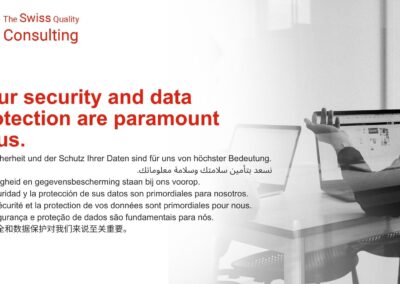Strategies for Complying with Data Privacy Laws and Regulations
Understanding Data Privacy Regulations
Data privacy compliance strategies are critical for organizations to protect personal data and avoid legal repercussions. In regions like Saudi Arabia and the UAE, where digital transformation is accelerating, businesses must navigate a complex landscape of data protection laws. These regulations are designed to safeguard individuals’ privacy and ensure that organizations handle data responsibly. Compliance with these laws is not merely about avoiding fines; it is about building trust with customers and maintaining a competitive edge. Organizations must stay informed about local and international data privacy regulations, including GDPR in Europe and various regional laws, to ensure they meet all legal requirements.
Implementing Robust Data Protection Measures
To effectively comply with data privacy laws, organizations must implement robust data protection measures. This includes developing and enforcing comprehensive data protection policies that outline how personal data is collected, processed, stored, and disposed of. In cities like Riyadh and Dubai, where technological advancements are rapidly evolving, it is crucial to integrate these policies with modern technologies such as Artificial Intelligence and Blockchain. For example, utilizing AI to monitor data access and Blockchain to ensure data integrity can enhance compliance and prevent data breaches. Regular audits and risk assessments should be conducted to identify and address potential vulnerabilities in data protection practices.
Training and Awareness for Compliance
Effective data privacy compliance requires more than just technical solutions; it also necessitates a cultural shift within the organization. Training and awareness programs are essential to ensure that all employees understand their roles and responsibilities in protecting personal data. In Saudi Arabia and the UAE, where the workforce is diverse and dynamic, tailored training programs can help employees navigate the intricacies of data privacy laws and adopt best practices. By fostering a culture of compliance, organizations can reduce the risk of inadvertent breaches and reinforce the importance of data protection throughout the organization.
Leveraging Technology for Enhanced Data Privacy Compliance
Utilizing Blockchain for Transparent Data Management
Blockchain technology offers a unique advantage for enhancing data privacy compliance. By creating immutable records of data transactions, Blockchain can provide a transparent and verifiable trail of data access and modifications. This technology is particularly relevant in the UAE and Saudi Arabia, where innovation and digital solutions are integral to business operations. Implementing Blockchain in data management processes can help organizations comply with data privacy regulations by ensuring that data handling practices are auditable and transparent. This can also facilitate compliance with regulatory requirements by providing a clear record of data transactions and consent.
AI-Driven Solutions for Data Privacy
Artificial Intelligence (AI) can play a significant role in supporting data privacy compliance strategies. AI-driven solutions can automate data protection tasks, such as identifying and responding to potential data breaches or anomalies in data access. In the context of the Metaverse and other advanced digital environments, AI can enhance privacy by analyzing large volumes of data to detect patterns indicative of privacy risks. By integrating AI into data privacy practices, organizations in Riyadh and Dubai can stay ahead of potential threats and ensure that their data protection measures are both proactive and reactive.
Executive Coaching for Data Privacy Leadership
Effective leadership is crucial for driving data privacy compliance within an organization. Executive coaching services can provide business leaders with the knowledge and skills needed to navigate the complex landscape of data privacy regulations. In Saudi Arabia and the UAE, where business leaders are pivotal in shaping organizational culture, coaching can help executives understand the importance of data protection and implement effective compliance strategies. By focusing on leadership development in the context of data privacy, organizations can ensure that their executives are equipped to make informed decisions and champion data protection initiatives throughout the organization.
Conclusion
Data privacy compliance strategies are essential for organizations to protect personal data and avoid legal repercussions. In regions like Saudi Arabia, the UAE, Riyadh, and Dubai, adhering to data privacy laws requires a combination of robust data protection measures, effective use of technology, and a culture of compliance. By leveraging technologies such as Blockchain and AI, and investing in executive coaching, organizations can enhance their data privacy practices and navigate the complexities of regulatory requirements. Ensuring compliance not only mitigates legal risks but also builds trust with customers and supports long-term business success. Embracing these strategies will position organizations as leaders in data protection and privacy, contributing to their overall success in the digital age.
—
#DataPrivacy #ComplianceStrategies #DataProtection #LegalRegulations #ArtificialIntelligence #Blockchain #Metaverse #ExecutiveCoaching #GenerativeAI #ModernTechnology #BusinessSuccess #LeadershipSkills #ManagementSkills #ProjectManagement #SaudiArabia #UAE #Riyadh #Dubai























